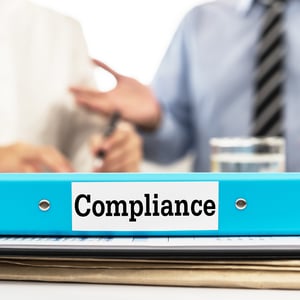Security compliance may seem like a hassle for an enterprise organization, but there are several benefits that every CEO and IT professional should keep in mind. Here are five of them.

If a startup or other enterprise business begins collecting personally identifiable information, it must abide by certain security compliance regulations.
There are many to follow, including the General Data Protection Regulation (GDPR), the Health Insurance Portability and Accountability Act (HIPAA), Gramm-Leach-Bliley Act (GLBA), and NYCRR Part 500. Nearly all these regulations require businesses to better protect the identifiable sensitive information of customers at the risk of financial penalty.
That may sound like it would restrict how businesses operate, but there are actually many benefits to complying with industry laws that protect the rights of employees and consumers.
Here are five bottom-line benefits that your company will enjoy by implementing and adhering to security compliance:
- Increased Cybersecurity. This is the best reason to comply with industry regulations, and not simply because it’s a requirement of the GDPR, NYCRR 500, or HIPAA. Increased cybersecurity helps customers who cannot control how their information is used, and it benefits the companies that collect and process their information because security-minded workflows ensure confidential company information stays confidential. Adapting to a higher security framework will also streamline your processes and decrease the number of vulnerabilities, thus reducing the chances of outside attack as well as malicious insider attempts. Consider that nearly half of firms in the UK have been attacked or breached. Tighter security and better-trained staff who can identify phishing scams and malware can help avoid such incidents by complying with industry regulations.
- Increased Customer Trust and Reputation. “With great power comes great responsibility” isn’t just a notable quote, it’s something for your business to live by. By complying with security laws, your reputation won’t take a hit. Instead, you’ll be known as the company that protects consumer data, and that will garner the trust and admiration of just not customers, but other business partners as well. Who wants to do business with a known liability that lacks a proactive, proven, well-managed data security system? Higher protection means better business equity and increased public trust. Breaches and leaks such as Equifax or the Facebook Cambridge Analytica scandal were two events that demolished the respective images of those brands. Show consumers you have a solid data protection system in place and watch consumer confidence soar.
- Improved Data Management. Several compliance orders, including the GDPR, NYCRR 500, and HIPAA require companies to know exactly what kind and how much information they have stored on their servers or in the cloud. This is a good thing because it encourages companies to identify and minimize the data they store, which decreases the likelihood of that important information leaking out. Businesses also gain a better understanding of their data footprint, which makes it easier to delete or hand over data to customers and it creates easier workflows for employees.
- Better Technology. To meet various compliance standards, it’s imperative for companies to invest in the latest network and security technologies. For example, cloud computing, which is used by 81 percent of enterprise companies, provides superior delivery and storing mechanisms for information than traditional on-site systems, and it offers better ways to weed out and plug up vulnerabilities thanks to instant detection and notifications. The cloud also allows for the automatic updating of software, which means companies will always have the latest software available. Regulations such as the GDPR also encourage the use of encryption technology, including third-party management software capable of layering on top of existing programs to provide superior pseudonymization techniques that render data unreadable without the proper encryption keys. With safeguards like that in place information can remain safe even if it’s stolen, and your enterprise company will remain at the cutting edge.
- Avoid Financial Penalty. One of the best security compliance benefits? You won’t have to pay out the nose or face the embarrassment of damaging headlines when you comply. Most regulations impose steep financial penalties upon companies that fail to meet their standards, particularly the GDPR which could cost companies up to 20 million euros or four percent of that organization’s annual global turnover. Some companies are already susceptible to getting hit with enormous penalties. Better to comply and improve your company, its security, and its standing with the people it serves than to pay unnecessary fines.
As mentioned above, the surefire way to bypass every compliance rule is to adopt encryption. A program such as the eperi Gateway provides encryption services that will safeguard sensitive information for a variety of apps and services, including Microsoft Office 365 and Salesforce. For questions about the eperi Gateway, or about compliance benefits for your enterprise business, contact eperi.
Recommended for You




